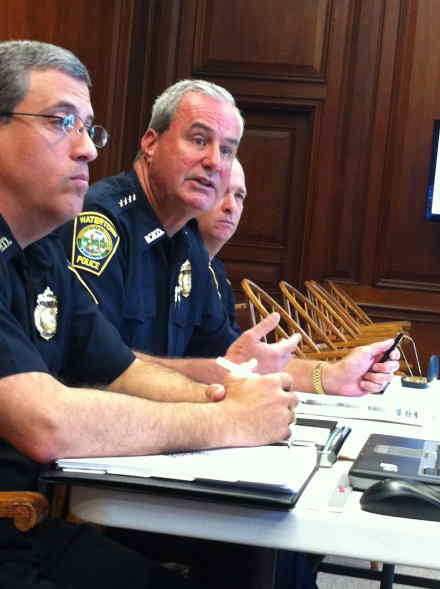
Charlie Breitrose
Watertown Police Chief Edward Deveau, center, reacted to the Boston Marathon Bomber’s statement at his sentencing hearing.
Watertown Police Chief Edward Deveau said he was disappointed by the apology of convicted Boston Marathon Bomber Dzhokhar Tsarnaev, adding that his words “rang hollow.”
Tsarnaev finally spoke publicly during the sentencing hearing on Wednesday in Boston Federal Court. He was officially sentenced to death by Federal Court Judge George O’Toole who said “Tsarnaev he had embraced a cruel God, heeded the jihadist ‘siren song’ and engaged in “monstrous self-deception” to carry out the bombings,” according to CNN.
In his statement Tsarnaev apologized and admitted to carrying out the bombing. He also referred to how he became award of the victims.
“I am sorry for the lives that I’ve taken, for the suffering that I’ve caused you, for the damage that I’ve done — irreparable damage …” Tsarnaev said. “Immediately after the bombing, which I am guilty of – if there’s any lingering doubt about that let there be no more. I did do it along with my brother. I learned of some of the victims. I learned their names, their faces, their age. And Throughout this trial more of those victims were given names, more of those victims had faces and they had burdened souls.”
Deveau attended the hearing, and said that he was disappointed by what he heard.
“It was disappintings, it rang hollow to me. It was too little and two years too late for me and my officers,” Devveau said on The Last Word with Lawrence O’Donnell on MSNBC on Wednesday. “He said ‘immediately after.’ The marathon bombing was on a Monday, then there was Tuesday, Wednesday and Thursday. Sean Collier was killed Thursday night. So if he was remorseful, Sean should still be a live today, Watertown should have never happened – the gunfight, my officers’ lives at risk, my community at risk.”
Deveau also noted that he never said that the bombing and shootings were bad.
“He did not renounce the terrorist acts he and his brother committed,” Deveau said. “I think that’s what we wanted to hear and have the nation hear that (and) around the world: what we did was wrong. He didn’t say that.”
For Deveau, the statement Wednesday did not carry the same weight what Tsarnaev scrawled on the boat on Franklin Street before his capture.
“The note on the boat tells more about what he was really thinking when the acts were committed than what he had to say today,” Deveau said. “He talked a little bit of asking for forgiveness, but it just rang hollow to everybody in the courtroom.”